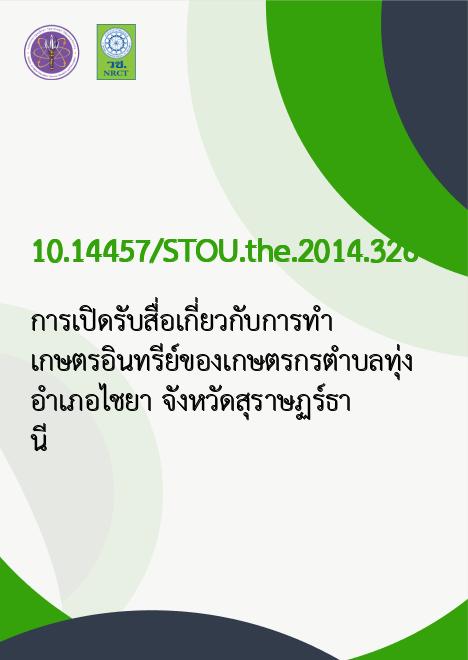
|
การเปิดรับสื่อเกี่ยวกับการทำเกษตรอินทรีย์ของเกษตรกรตำบลทุ่ง อำเภอไชยา จังหวัดสุราษฏร์ธานี |
|---|---|
| รหัสดีโอไอ | |
| Title | การเปิดรับสื่อเกี่ยวกับการทำเกษตรอินทรีย์ของเกษตรกรตำบลทุ่ง อำเภอไชยา จังหวัดสุราษฏร์ธานี |
| Creator | อิงลดา ปิยะกาญจน์ |
| Publisher | มหาวิทยาลัยสุโขทัยธรรมาธิราช |
| Publication Year | 2557 |
| Keyword | มหาวิทยาลัยสุโขทัยธรรมาธิราช. แขนงวิชานิเทศศาสตร์--การศึกษาเฉพาะกรณี, มหาวิทยาลัยสุโขทัยธรรมาธิราช. สาขาวิชานิเทศศาสตร์--การศึกษาเฉพาะกรณี, เกษตรอินทรีย์--ไทย--สุราษฏร์ธานี, การศึกษาอิสระ--นิเทศศาสตร์ |
| Abstract | การศึกษาค้นคว้าอิสระนี้มีวัตถุประสงค์เพื่อศึกษา 1) การเปิดรับสื่อเกี่ยวกับเกษตรอินทรีย์ของเกษตรกร ตำบลทุ่ง อำเภอไชยา จังหวัดสุราษฎร์ธานี 2) ความต้องการด้านเนื้อหาเกี่ยวกับเกษตรอินทรีย์ของเกษตรกร ตำบลทุ่ง อำเภอไชยา จังหวัดสุราษฎร์ธานี และ 3) อุปสรรคในการเปิดรับสื่อเกี่ยวกับเกษตรอินทรีย์ของเกษตรกร ตำบลทุ่ง อำเภอไชยา จังหวัดสุราษฎร์ธานีการศึกษานี้เป็นการวิจัยเชิงปริมาณ กลุ่มตัวอย่างคือ เกษตรกรที่ทำเกษตรอินทรีย์ตำบลทุ่ง อำเภอไชยา จังหวัดสุราษฎร์ธานี จำนวน 400 คน โดยเลือกตัวอย่างแบบเจาะจง เครื่องมือในการเก็บข้อมูล คือ แบบสอบถาม สถิติที่ใช้ในการวิเคราะห์ข้อมูล ได้แก่ ค่าความถี่ ค่าร้อยละผลการวิจัยพบว่า 1) กลุ่มตัวอย่างส่วนใหญ่เป็นเพศชาย มีอายุระหว่าง 41-50 ปี มีการศึกษาระดับมัธยมปลาย/ปวช. รายได้เฉลี่ยต่อเดือนมากกว่า 15,000 บาท ระยะเวลาในการทำเกษตรอินทรีย์ระหว่าง 6-10 ปี 2) กลุ่มตัวอย่างส่วนใหญ่เปิดรับสื่อเกี่ยวกับเกษตรอินทรีย์ทางวิทยุกระจายเสียงมากที่สุด รองลงมาคือ โทรทัศน์ และสื่อบุคคล ตามลำดับ ส่วนใหญ่ฟังรายการวิทยุทุกวันขณะเดินทางในช่วงเช้า และชมรายการโทรทัศน์เกี่ยวกับเกษตรอินทรีย์สัปดาห์ละ 3-4 วันในช่วงเช้าและจากสื่อบุคคลในช่วงเย็น ณ ที่ประชุม ประจำทุกเดือน 3) กลุ่มตัวอย่างมีความต้องการด้านเนื้อหาเกี่ยวกับการทำเกษตรอินทรีย์ คือ ด้านผลกำไรของการทำเกษตรอินทรีย์มาก ที่สุด รองลงมาคือ ตลาดสำหรับการผลิต งบประมาณ ชนิดของพืช ระบบน้ำที่ใช้ การใช้ปุ๋ยสถานการณ์ในการทำเกษตรอินทรีย์ วิธีการทำเกษตรอินทรีย์ ที่ปรึกษาด้านเกษตรอินทรีย์ ดินที่เหมาะสมในการทำเกษตรอินทรีย์ ตามลำดับ 4) อุปสรรคในการเปิดรับสื่อ คือ มีเวลาจำกัดในการฟังและชมรายการเกี่ยวกับเกษตรอินทรีย์ในช่วงเช้าเนื่องจากต้องเดินทางไปทำงาน || The objectives of this research were to study 1) the level of exposure tomedia about organic farming of farmers in Thung Sub-district, Chaiya District, Surat Thani Province; 2) their demand for content about organic farming; and 3) obstacles to their access to media about organic farming.This was a quantitative research based on a survey of 400 sample farmerswho were engaged in organic farming in Thung Sub-district, Chaiya District, Surat Thani Province. The sample population was chosen through purposive sampling. The data collection tool was a questionnaire. Data were statistically analyzed using frequency and percentage. The results showed that 1) the majority of samples was male, in the 41-50 age range, and educated to upper secondary or vocational school level. They earned an average income of over 15,000 baht a month and had done organic farming for 6-10 years. 2) The majority said they were exposed to media about organic farming through the radio most often, followed by TV and personal media. Most of them listened to a radio program about organic farming every morning while travelling to work and watched a TV program about organic farming 3-4 days a week, also in the morning. They were exposed to personal media about organic farming at a monthly meeting held in the evening. 3) The topic that they most desired to learn more about was profits from organic farming, followed by markets for their products, budgeting, plant varieties, irrigation systems, use of fertilizer, the status of organic farming, organic farming methods, organic farming consultants, and suitable soil types, in that order. 4) The major obstacle the farmers reported in accessing media about organic farming was that they had only a limited amount of time during the morning to listen to or watch programs. |
| URL Website | https://repository.stou.ac.th |
| Website title | STOU Digital Repository |